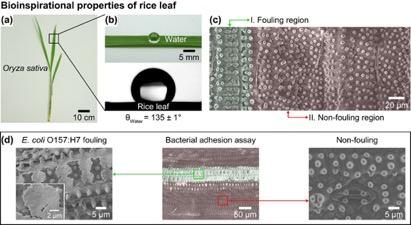
Credit:
COLLEGE STATION — Texas A&M AgriLife Research and the Texas A&M Engineering Experiment Station, TEES, were recently awarded a grant from the U.S. Department of Agriculture’s National Institute of Food and Agriculture to study and develop super-repellent and anti-fouling surfaces for foods.
The grant will be used in their collaboration to help ensure the safety of fresh food products, benefiting both consumers and the produce industry.
“There is a need to reduce those outbreaks associated with microbial contamination that may take place in different operations along the fresh produce chain,” said Dr. Luis Cisneros-Zevallos, AgriLife Research food scientist in College Station and co-principal investigator for the project. “The surfaces we are designing avoid cross-contamination and reduce the risk of biofilm formation.”
“In recent years, we have developed various types of nanotechnology-based coating with an intriguing combination of surface texture and chemistry to inhibit and prevent the attachment of microorganisms on plastics, metals, ceramic and glass at the laboratory scale,” said Dr. Mustafa Akbulut, TEES chemical engineer in College Station and principal investigator for the project.
“With this project, we will design novel coatings, which are specifically tailored for the food industry and also suitable for large-scale production and application to achieve a broad impact on relevant stakeholders,” Akbulut said.
Food safety outbreaks in recent years have caused illnesses and deaths among consumers, negatively affecting the fresh produce industry on a large scale.
After observing the natural morphology and chemistry of rice leaves which have hydrophobic super-repellent characteristics, the team was inspired to create novel surfaces that mimicked leaves’ ability to reduce the attachment of microorganisms.
“Bioinspiration is key when it comes to using nanotechnology strategies, specifically when you want to provide surfaces with unique characteristics of polarity and morphology,” Akbulut said.
The interdisciplinary research team also includes Texas A&M University food microbiologists Drs. Matt Taylor and Alejandro Castillo in College Station.
“Our team is a pioneer in this area, in the U.S. and worldwide,” Cisneros-Zevallos said. “We certainly believe that it will transform the way the fresh produce industry operates, and we hope the industry will adopt many of the products our project will develop in the next few years of the grant.”
###
For more information on the project, go to http://bit.
Media Contact
Laura Muntean
[email protected]
Original Source
https:/




